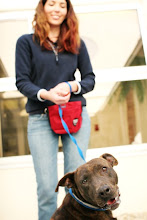Welcome to the final instalment of the Dog Behavior Workshop!
Let's start off with a little dog training history.
It is interesting to point out that back in the late 1800's early 1900's dog training was more like today's approach than the more recent one of the 60's and 70's. Originally dogs were trained as hunters, or to assist in a hunt, after that they were used by the military. The military used mostly physical adversives, punishment and praise to train, whereas modern reward based methods focus heavily on positive reinforcement.
Dr. Ian Dunbar, DVM popularized lure reward training and Karen Pryor, marine mammal training brought clicker training to the scene.

In clicker training one can see the classical conditioning parallels. Instead of a dog salivating to a bell, an animal associates a click as a reward. Clickers are great used as bridges for shaping a behavior.
There are many benefits to modern training methods such as:
Promotes communication
Builds a relationship of understanding
Family Friendly
Pro-active
When having to correct your dog, NO may not always be sufficient. Always redirect your dog to an appropriate behavior. We spend a lot of time telling our dogs what they cannot do, and very little time letting them know what they can!
Now I know many of you out there may be fans of some dog training shows on TV so I want to mention a few things about dominance. Not all behavior problems or aggression are caused by dominance! Dogs are NOT born leaders. They are pack animals therefore they are actually born followers. NEVER force your dog into an "alpha roll"as this method is confrontational and outdated.
The modern positive reward training is scientifically proven, increases teamwork and promotes a harmonious relationship. It fulfills both the needs of the dog and the human!
The importance of understanding the needs of our K9 friends is great. Did you know that the number one cause of death for dogs is actually euthanasia!? And the highest reason for relinquishment to a shelter is lack of education on the part of owners.
Exercise is also very important. Remember a tired dog is a happy dog and a sleeping dog cannot get into mischief.
Mental stimulation is also very important. Dogs get bored. If you do not give your dog something to do, they will find something, and it wont always please you!
Mental work keeps your dogs happy and healthy and prevents the 'crazies'!
Be realistic. We love the dogs we HAVE not the ones we wish we did! The best home for you dog is YOURS. If you are not willing to deal with your dogs behavior, how can you expect others to be?
Adjust your expectation accordingly. Don't forget to praise your dog for doing nothing! Set achievable goals.
Remember this and you'll be fine:
Patience
Consistency
Sense of humor






